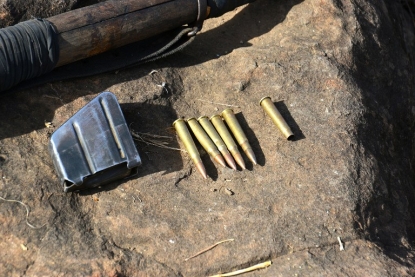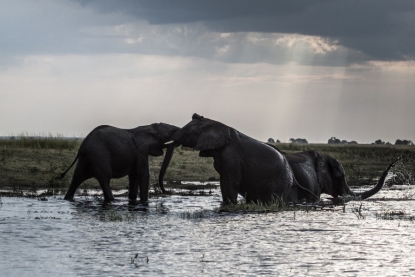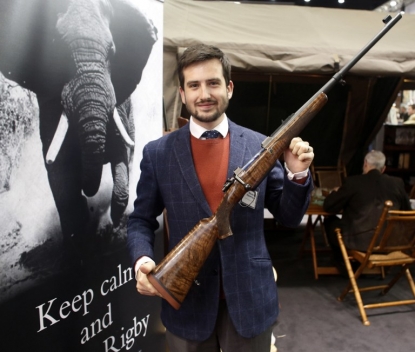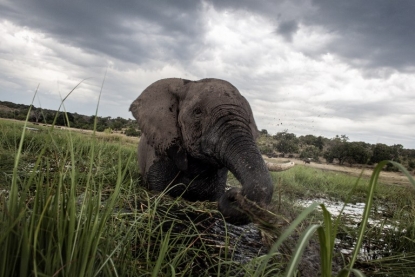Elephants, hunters and storybooks
JOHANNESBURG, May 29, 2015 - I was born in the Paris suburbs. I studied in Lyon and Lille. I have never experienced the conflict between the urban and rural worlds, between tradition and the post-modern. I have never hunted, and I never will. Especially not an elephant. How could anyone think of killing such a wise, majestic creature? How could anyone want to hang its skull on their living room wall?
People willing to defend hunters are few and far between these days. Those who hunt for hunting's sake, for a "trophy", a picture snapped beside some poor animal slain without a chance to fight back, are widely seen as criminals. Be they the King of Spain or a lowly amateur, they are liable to be dragged through the mud on social media. The death of a safari hunter - if at all possible trampled by an elephant - is greeted with satisfaction, if not hateful glee by the online public. "Serves you right," is the gist of it.
 Cartridges recovered from suspected poachers in Kenya's Lake Nakuru National Park in March 2015 (AFP / STR)
Cartridges recovered from suspected poachers in Kenya's Lake Nakuru National Park in March 2015 (AFP / STR)A few months back I attended an international conference on African elephants, held in Kasane in the north of Botswana, which is home to more than a quarter of the 470,000 that still roam the continent. The "town" depends entirely on tourism. Down by the riverside, there are guest lodges offering views of wallowing hippopotamuses. Towards the road, you find the homes of local residents, most of whom work in tourism, whether as tour guides or hotel employees. The area's whole economy hinges on the ability of visitors to see and photograph splendid pachyderms, lazy lions and ferocious crocodiles.
No political correctness here
In January 2014, the Botswana government banned hunting, barring a few exceptions. As a journalist this strikes me as a good story, but I fear I will struggle to find anything but politically-correct, anti-hunting views on the matter.
It turns out to be quite the opposite. Three days in, I have yet to meet a single person ready to defend the government's position. If it carries on like this I will have to interview my own mother for a counterpoint.
 Elephants splash in the Chobe river in Botswana (AFP / Chris Jek)
Elephants splash in the Chobe river in Botswana (AFP / Chris Jek)The tour guides? Of course they don't approve of hunting. But all of them - whether black or white, local or foreign - understand the problems faced by villages here since the ban, from their difficulty cohabiting with wild animals, to the substantial lost revenue from safari hunting. They also fear the ban will encourage poaching. And so they argue for the compromise backed by many African governments: allow hunting within a set framework, focusing on elderly males who are no longer essential for reproduction but who can bring in big bucks.
Hunting permits for infrastructure
The NGOs at the conference? Hunting - within set limits, focusing on specific animals - can actually be a positive tool for conservation, they explain. In areas too difficult to access for most tourists, why deprive yourself of an economic boon from "trophy" hunting? By letting one elephant be killed you can bring in revenue that helps keep several herds alive.
I meet people who have never viewed elephants with tenderness or admiration. They own no cameras, and they live with the elephants all year round in Mabele, a village on the edge of the Chobe nature reserve.
Selling hunting permits to foreigners has enabled Mabele and three neighbouring villages to build infrastructure and shops, to buy new tractors. Now that source of income has dried up. The head of the village cooperative tells me the coffers are empty, and that he is not certain he can pay his staff's wages.
(Video: Botswana's marauding elephants trigger hunting ban debate)
Emboldened by the hunters' disappearance, meanwhile, elephants have been encroaching on the village, leaving a trail of destruction in their wake. A local woman shows me, furious, how they trampled across her maize field, destroying her entire harvest.
No more sacred than an cow or sheep in the West
By this point I have had to review some of my certainties. Elephants are not just the storybook creatures I held them to be, magnificent from the tip of their trunk to their wrinkly legs, roaming through vast open spaces at peace with the herd.
They are also wild animals, no more sacred in the eyes of these villagers than a cow or a sheep in the West.
At the conference the Botswana government defends its stance, which it casts as urbane and forward-looking. Hunting is a thing of the past, it argues, and anyway it hardly creates any jobs.
This is my story - two conflicting visions of hunting, and a government disowned by almost everyone I speak to. I write an article and video script, knowing all the while that my angle is likely to be raise eyebrows at home.
 Marc Newton, managing director of Rigby London poses with a hunting rifle at the 'Hohe Jagd' hunting fair in Salzburg , Austria in February 2015 (AFP / Dieter Nagl)
Marc Newton, managing director of Rigby London poses with a hunting rifle at the 'Hohe Jagd' hunting fair in Salzburg , Austria in February 2015 (AFP / Dieter Nagl)Sure enough. On Twitter the acid comments fly: 'Since they get in our way, like sharks, let's just exterminate them'! writes one user. To see elephants as either 'a resource or a nuisance' is a dead end, says another.
Right. Seen from afar, elephants are perhaps the most noble creatures alive. Neither a resource nor a nuisance. But for all the people I met in Botswana, this is nothing to do with morality or symbols. It is a practical debate: elephants, lions and other rare mammals are their country's main resource after diamonds. The issue is how to protect that resource, and how to protect themselves from it too. How to reap maximum benefits from it, and reduce the harm it also causes. With or without hunting.
Let's be honest here: I still don't understand hunters. Spending 10, 50, 300 thousand dollars to shoot dead an animal - a beautiful, living, feeling creature? Absurd and unbearable. Like the pride on their faces in those photographs, one hand on their gun and the other on the corpse at their feet.
I have not changed my mind. But I have changed my point of view. The idea that to protect something, you must not kill, seems simple and sensible enough. In reality it is simplistic. That is how being a foreign correspondent can sometimes land you in impossible debates with friends at home.
Julie Jammot is an AFP video reporter based in Johannesburg
 (AFP / Chris Jek)
(AFP / Chris Jek)

